- News
- Reviews
- Bikes
- Components
- Bar tape & grips
- Bottom brackets
- Brake & gear cables
- Brake & STI levers
- Brake pads & spares
- Brakes
- Cassettes & freewheels
- Chains
- Chainsets & chainrings
- Derailleurs - front
- Derailleurs - rear
- Forks
- Gear levers & shifters
- Groupsets
- Handlebars & extensions
- Headsets
- Hubs
- Inner tubes
- Pedals
- Quick releases & skewers
- Saddles
- Seatposts
- Stems
- Wheels
- Tyres
- Tubeless valves
- Accessories
- Accessories - misc
- Computer mounts
- Bags
- Bar ends
- Bike bags & cases
- Bottle cages
- Bottles
- Cameras
- Car racks
- Child seats
- Computers
- Glasses
- GPS units
- Helmets
- Lights - front
- Lights - rear
- Lights - sets
- Locks
- Mirrors
- Mudguards
- Racks
- Pumps & CO2 inflators
- Puncture kits
- Reflectives
- Smart watches
- Stands and racks
- Trailers
- Clothing
- Health, fitness and nutrition
- Tools and workshop
- Miscellaneous
- Buyers Guides
- Features
- Forum
- Recommends
- Podcast
3T launches Exploro - the world's first aero gravel/adventure frameset
3T is launching a new gravel/adventure frameset called the Exploro that’s been designed with a major focus on aerodynamics. This frameset has been developed by Gerard Vroomen, the Cervelo co-founder who now part owns the Italian brand.
Why is 3T, a mostly (although not exclusively) roadie brand, throwing its weight into gravel?
“When cycling started, all road cycling was gravel cycling so in that sense it’s nothing new,” says Gerard Vroomen. “We’re excited about this gravel 2.0 movement as we think it connects back to what cycling is all about. For us it’s about experiencing the great outdoors, it’s about freedom, it’s about going to places you might not otherwise go to and exploring your surroundings.
“A lot of people initially think it’s something for the US Midwest, but when you start to look around where you live it’s amazing how many unpaved roads still exist in this world.
Okay, we’ll buy that, but surely the aero gravel market is a niche of a niche?
“Aerodynamics should in theory matter even at low speeds,” says Gerard. “We wondered whether an aerodynamic product would give us an advantage over a non-aerodynamic product even at gravel speeds and in gravel conditions so we went to the Low Speed Wind Tunnel in San Diego [California] to find out.”
Last year, 3T first tested a round-tubed frame with shallow (24mm deep) rim wheels fitted first with 28mm tyres and then with 40mm knobbly tyres at a wind speed of 20mph. Then it tested the same frame with a 3T Discus C35 (32mm deep) rim and the same tyres and found a small reduction in drag, and then again with 3T’s Discus C60 (58mm deep) rims.
“The drag was roughly the same with a deep section aero rim with the knobbly tyres as it was with the shallow rim with a road (28mm tyre),” says Gerard. “At zero [yaw] it doesn’t do quite as well – no matter what rim you have, it’s invisible to the wind behind that wide tyre – but as more of the deep section rim becomes visible to the wind, it can start to straighten out the messy airflow you get off the knobbly tyre.
“This got our imaginations going and we started wondering what we could do to make gravel riding even faster, and therefore we are introducing the Exploro which is the world’s first frame that combines a gravel road capability with low speed aerodynamics.”
The Exploro features what 3T is calling Sqaero tube profiles, which essentially means you get a leading edge designed for aerodynamic efficiency with a square rear section, the idea being that the airflow behaves largely as if the profile had a long, tapering tail. As well as reducing drag, this profile is designed to provide strength and stiffness without making the frame too difficult to handle in crosswinds.
The Sqaero down tube really is a monster compared to that of an aero road bike, say, because it has to manage the air of much larger gravel or even mountain bike tyres.
“This width of the down tube means we can also make the bottles almost disappear aerodynamically,” says Gerard.
3T took the development Exploro frame to the wind tunnel in San Diego and ran tests against a frame of the same geometry but with round tubes of equal width. They decided not to test either setup with a mannequin onboard because that slows the testing process hugely, although tests will be undertaken with a mannequin in September.
“Even with knobbly tyres fitted, the Exploro is faster than the round tube bike with a road tyre,” says Gerard. “That’s how big the effect of the Sqaero tubing is in straightening out the airflow. At 20mph the difference is 7 watts and at 30mph the difference is about 24 watts. If you go to wider (2.1in) mountain bike tyres, the Exploro frame will still save you time compared to a standard frame.”
3T even compared drag across dirty frames having printed 3mm deep ‘mud’ and applied it in the wind tunnel. It found that the drag was pretty much the same with mud as it was without.
Other features
The Exploro’s geometry is intended to be tailored towards both fast and comfortable riding – far closer to a road or cyclocross position than to a mountain bike position. To take a medium sized frame as an example, the seat tube is 490.2mm, the top tube is 550.3mm, and the head tube is 125.2mm. The stack (the vertical distance between the centre of the bottom bracket and the top of the head tube) is 546.5m and the reach ( the horizontal distance between those two points) is 377.96mm (crikey! That’s precise).
3T wanted to keep a road bike’s Q factor (the distance between the pedal attachments) and with clearance for such wide tyres that didn’t leave much space for chainstays so it put a drop in on the driveside one to move it out of the way.
As a guideline, the Exploro will take tyres up to 2.1in wide with a 650b wheel and a 40mm tyre with a 700c wheel (although that might depend on the exact rim/tyre combo you use).
The steering is designed to be agile while 3T has opted for 415mm chainstays – unusually short for a gravel or cross bike.
“Together, the front and rear are perfectly balanced,” says Gerard. “You can make very tight turns on really tricky terrain, and you’ll feel like you’re riding on a fast bike across the asphalt rather than as if you’re on something that’s not appropriate to the surface.”
All of the cables are routed internally and a tiny window in the seat tube allows you to check that there’s sufficient seatpost inside the frame. You can choose between two bottle cage positions on the down tube, although you need to opt for the upper one if you want to attach a cage to the seat tube too. If you’re only installing one, the lower position is the more aero option. You also get two attachment anchors for top tube bags.
One other notable feature is the Hang Loose rear derailleur hanger that’s designed to make re-installing the rear wheel easier. You first replace the rear wheel and get the brake rotor alignment right, then you install the thru axle to stabilise the rear wheel before installing the Hang Loose hanger. It’s easier than it sounds, honestly.
Options
The Exploro is available in two different versions. They’re the same geometry but the grade of carbon fibre differs. The Team version (£2,400), available in Racing White, weighs a claimed 1,150g while the LTD model (Stealth Black, £3,300) is a claimed 950g.
Both come as frame, fork and seatpost kits. Large sizes are available now with small, medium and XL sizes following in August.
Stay tuned to road.cc for a First Ride very soon.
Mat has been in cycling media since 1996, on titles including BikeRadar, Total Bike, Total Mountain Bike, What Mountain Bike and Mountain Biking UK, and he has been editor of 220 Triathlon and Cycling Plus. Mat has been road.cc technical editor for over a decade, testing bikes, fettling the latest kit, and trying out the most up-to-the-minute clothing. He has won his category in Ironman UK 70.3 and finished on the podium in both marathons he has run. Mat is a Cambridge graduate who did a post-grad in magazine journalism, and he is a winner of the Cycling Media Award for Specialist Online Writer. Now over 50, he's riding road and gravel bikes most days for fun and fitness rather than training for competitions.
Latest Comments
- Webstaff 1 hour 43 min ago
Those same car are also likely to have auto stop....
- Webstaff 1 hour 59 min ago
Also we only get one side of the story when it's social media....
- No Skinny Tyres 2 hours 29 min ago
It's a stabiliser, it was first used in WW2 to preserve chocolate in US rations. It allows the milk solids to fully dissolve, US chocolate is less...
- Rome73 2 hours 45 min ago
LOL , me too the other day, I was on my GSD and got stuck behind a Cadillac Escalade (I think that is what they are called). It was so fat and over...
- eburtthebike 11 hours 17 min ago
The deterrent effect is almost certainly due to the massively increased likelihood of the offence being detected. As with other crimes, if the...
- Martin1857 11 hours 44 min ago
As a member of the Co-op community (I live in a Housing Co-op) and a bike owner /rider, this is very sad news. We need more Co-ops not less.
- Dnnnnnn 11 hours 35 min ago
It is sad for the individuals concerned but (and this is a general point, rather than specific to this story), we're much better off overall for...
- No Reply 12 hours 26 min ago
I agree with Pogacar regarding social media. The likes of Facebook, Instagram have done untold damage, especially to the minds of young people....
- David9694 12 hours 31 min ago
Lorry carrying 25 tonnes of beer catches fire on the M11...
- ktache 13 hours 36 min ago
That looks like a fun bike. Frame only, 2 and an 1/2 grand.
































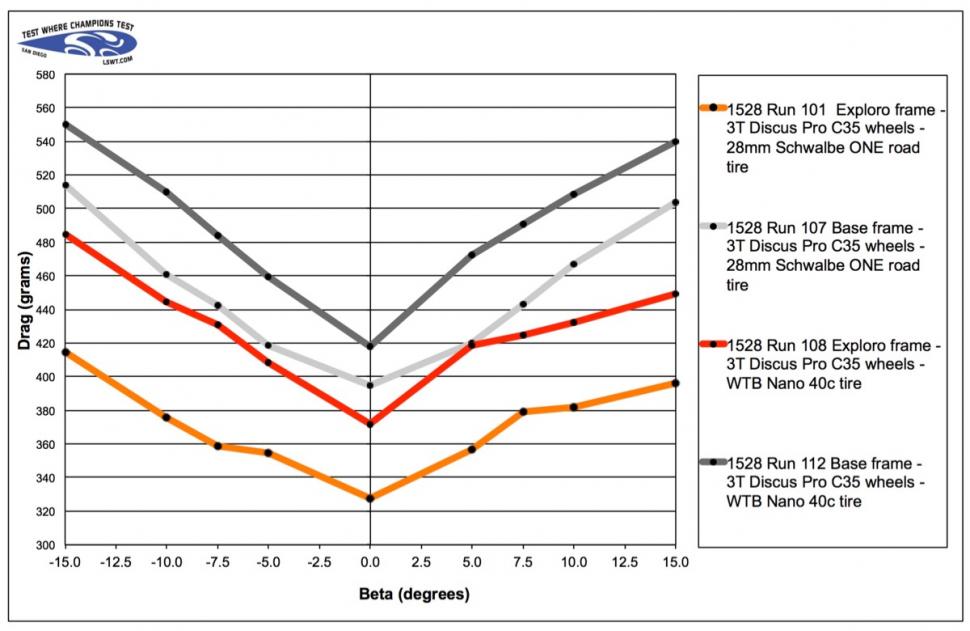
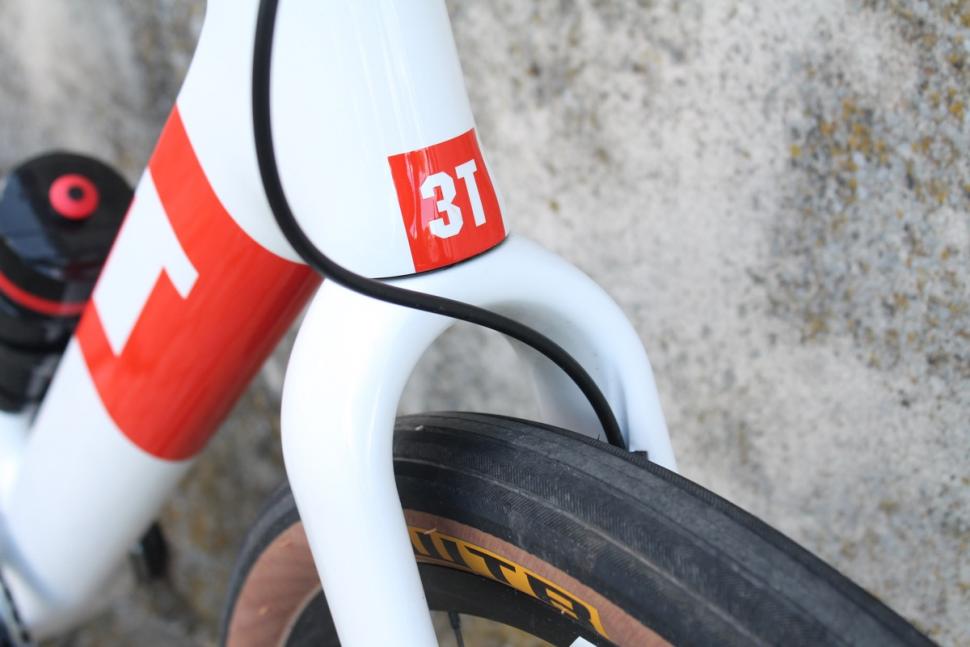




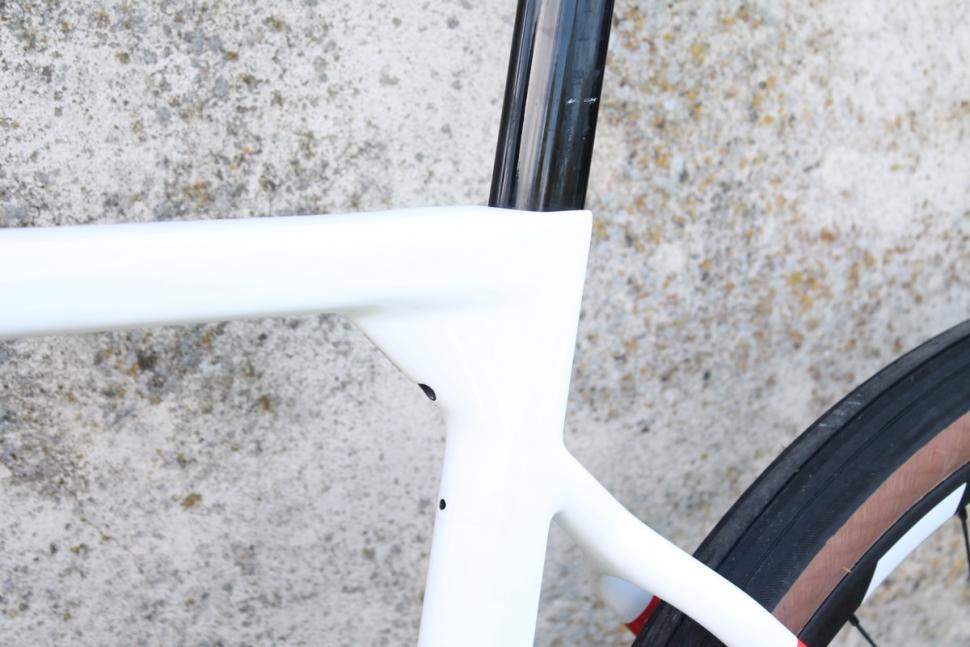
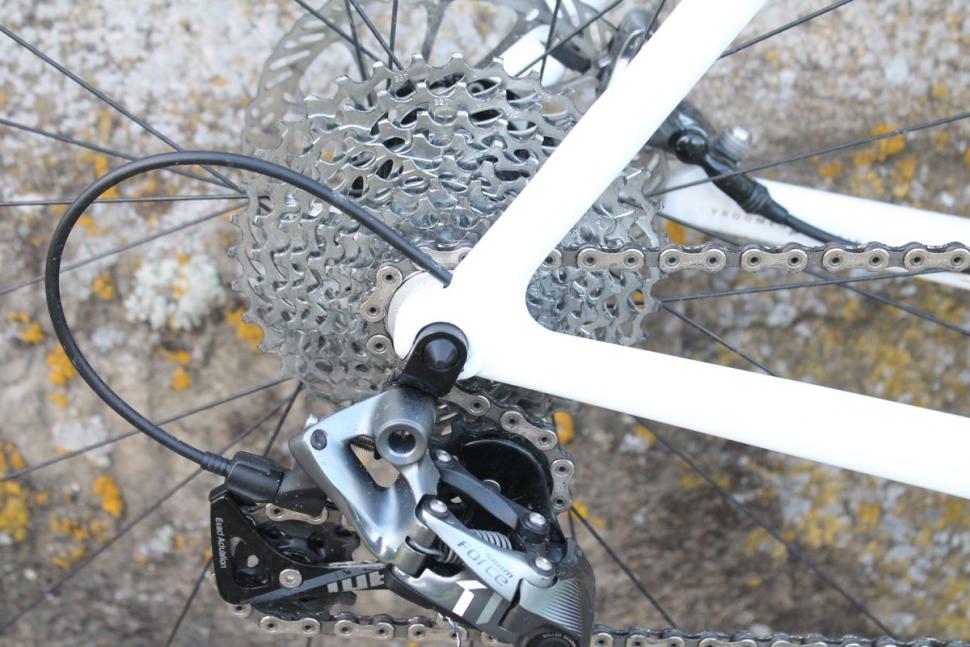
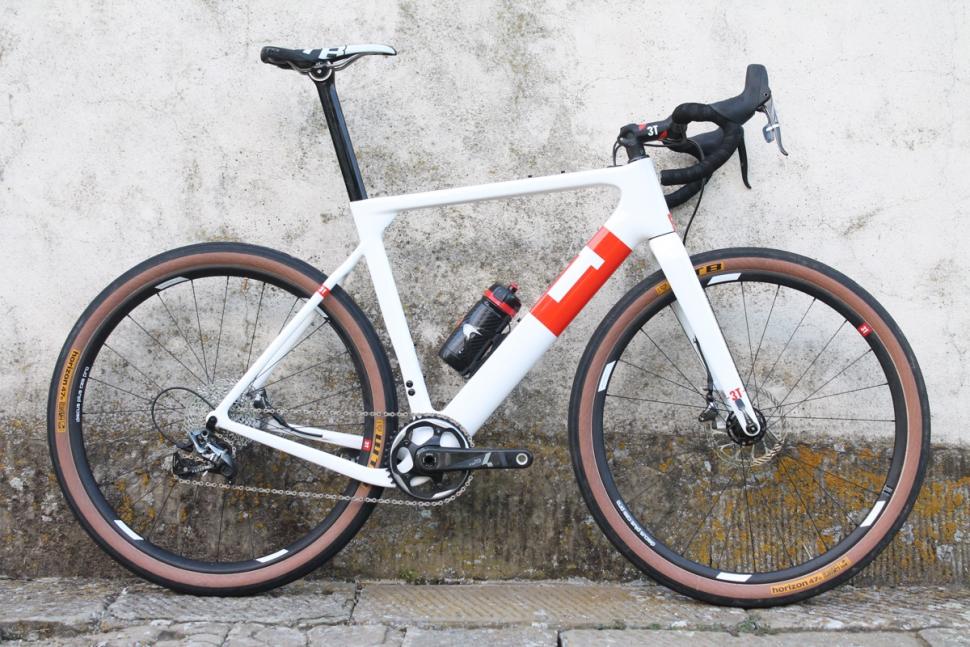
Add new comment
8 comments
So, to achieve aerodynamic tube profiles they over-size, probaly making them stiffer, but also thinner tube walls, so more succeptible to impact damage? Probably the last two things I'd be sticking on specification list for a bike designed for riding long distances on rough roads. Being aero might make a difference in a 1-hour CX, but gravel riding - seriously?
Frame bags + aero frame = pointless?
Are people who like to go fast, or maybe amateur racers, not allowed to ever go touring? Or should they just have to buy a completely new bike just to go packing?
Yeah I guess that's a fair point.
Looks like the perfect road bike for non racing UK riders to me. Not every gravel bike is ridden on gravel. People might want an all round bike that's aero for long road sections, downhill aero, clearance for fat tyres to give more comfort on UK shitty roads, might fancy taking it off road with knobblies on. Yeah sure it's a niche bike, but it fills just about every niche on the roadie side plus more, fantastic bike, wish I could afford one.
So it's an OPEN UP aero frame, well the price is more or less the same.
Nope, but input from the same designer for both.
Love inovation. Love the set up.
Just back from 5 days of actual gravel touring. 150kms per day.
So that is just DAFT.
AERO on dirt roads at 15mph is daft
rubbish selection of gears is daft
9cm stem on an AERO bike? , surly the body will be up in the wind, and the body is 80% of the drag, but you need it for handelling on a gravel bike, but you say its aero?
A clusterphuck of a bike with lovely internal hydro cables.